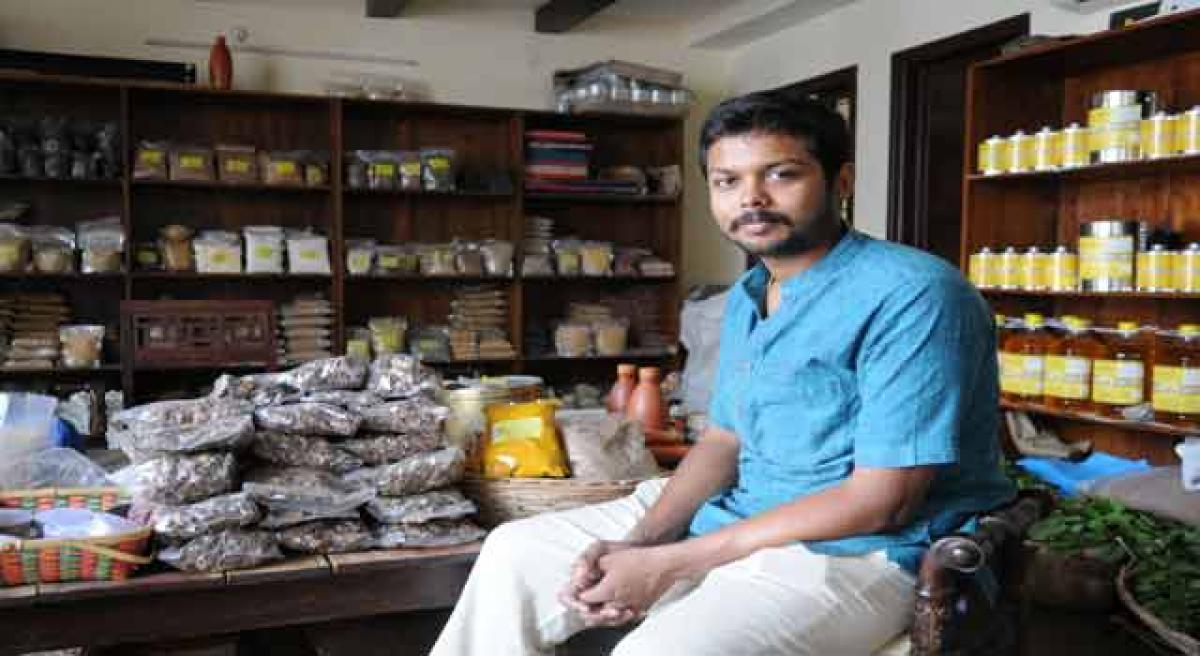Live
- Sanju Samson and Tilak Varma Shine: Record-Breaking Feats in 4th T20I Against South Africa
- India Urges $1.3 Trillion Annual Climate Support for Developing Nations
- Bad air: 106 shuttle buses, 60 extra Metro trips planned to make Delhiites give up cars
- WHO reports declining monkeypox cases in Congo
- CM Attends Kotideepotsavam on Kartika Purnima
- PKL Season 11: Raiding trio of Devank, Ayan, Sandeep help Patna Pirates rout Bengal Warriorz
- Food waste crisis fuels sustainable practices across APAC food & beverage industry: Report
- AI helps erase racist deed restrictions in California
- ATMIS completes third phase of troops' drawdown in Somalia
- PM Kisan Samman Nidhi scheme bringing smile to Nalanda farmers
Just In

If organic farming is a natural way, shouldn’t organic produce’ just be called ‘produce’ and make the pesticide-laden stuff take the burden of an adjective? This pertinent question on a food guide site depicts how natural has become unnatural and strange in the new world order.
If organic farming is a natural way, shouldn’t organic produce’ just be called ‘produce’ and make the pesticide-laden stuff take the burden of an adjective? This pertinent question on a food guide site depicts how natural has become unnatural and strange in the new world order.
Scientific developments, mass production programmes and consumerist societies have created air, soil and water pollution that have tainted the food we consume converting it into slow poison... sapping away our energy and destroying the quality of our life. We are what we eat, but are we aware of the toxins that go into the seemingly healthy foods we consume?
“Sadly there is no awareness of the damage that refined oils, pulses, rice, sugars, and vegetables grown with genetically modified seeds and an overdose of pesticides cause to our body. The increasing number of cancers and lifestyle disorders that have become the bane of society today are a result of the toxins that we take in as food.
That is why I decided to grow my own food products in ‘the natural way’ of cultivation adopted by Padmasri awardee Subhash Palekar,” says 25-year-old P Ravi Teja, CEO of VG Natural’s the store that has naturally cultivated products and cold-pressed Safflower oil in the Banjara Hills area of Hyderabad.
The youngster who has spent over nine years studying methods of edible oil extraction and research (ever since he was a college going youth) quit a lucrative job in an MNC within two months of joining, to live his dream.
VG naturals is the only place in south India that uses a cool pressed wooden churner (ganuga) the most ancient method of natural extraction of oil which retains the taste, aroma, colour and nutritional value and is one of the most suitable edible cooking oils that can be used over a wide range of salads to deep frying.
Carved from bubble wood both the preparation of the wooden oil press and extraction of oil through this churner require a special technique, with the wood having to be replaced every two months. The churner is made by a person in Pune and is a dying art since there is none to carry on this tradition after him according to Ravi Teja.
The three persons who work on the ground floor, of the shop where the oil is extracted, are specially trained in this work and all hail from Maharashtra. The process begins with grinding the white coloured safflower seeds, separation of the hulk, soaking the separated mixture overnight and, drying before finally extracting oil from the churner.
While Sunflower is a genetically modified variety Safflower (known as Kusuma in Telugu) is an indigenous variety that grows only in winter and has to be harvested before 6.30 am each time. Grown on a 20-acre farm in Koikuntla in Rangareddy district along with Mango, Guava, vegetables, millets and other crops in the intercropping pattern and without any pesticides, Safflower is as good as pure Desi ghee and has enormous health benefits.
“Refined oils are treated with 11 different kinds of chemicals and their residues are highly dangerous for the heart and the immune system. One gets a litre of oil from three kgs of Sunflower seeds. With the cost price working out to 360 how are they able to sell at 160 per litre?” Ravi Teja asks.
The Safflower oil is priced at 290 a litre and sold in special metallic tins that are ordered from Jamshedpur. The husk is compiled into cakes and used as fodder for animals and natural manure in farms.
“Rather than sit back earn well and party through the weekend, like most people of my generation, I wanted to make a meaningful contribution to society by making people aware of the toxins we unknowingly consume each day.
We have to go back to our roots and rediscover the beauty of the methods followed by our ancestors,” reiterates Ravi Teja, who is proud of the healthy practises followed in his household.
The youngster whose family has been in the textile business does not own a refrigerator, microwave or a pressure cooker. Cooking is done in mud pots and vegetables wrapped in a cloth stay fresh throughout the week.
Apart from the oil, single polished rice, unrefined sugar and rock salt, (From the Himalayas) are an array of snacks, sweets and homemade pickles made with Safflower oil displayed prominently in his store. Organic stores and food joints buy this oil which is also exported to several countries.
It is also in great demand in the preparation of Ayurvedic medicine. Metallic containers and cans, earthen pots and brass vessels that are now seen as antiques are all part of this store that believes in propagating all things natural. It is an ideal destination for those who want to redefine the quality of their lives through the lens of tradition rooted in science.
By:Aruna Ravikumar

© 2024 Hyderabad Media House Limited/The Hans India. All rights reserved. Powered by hocalwire.com







